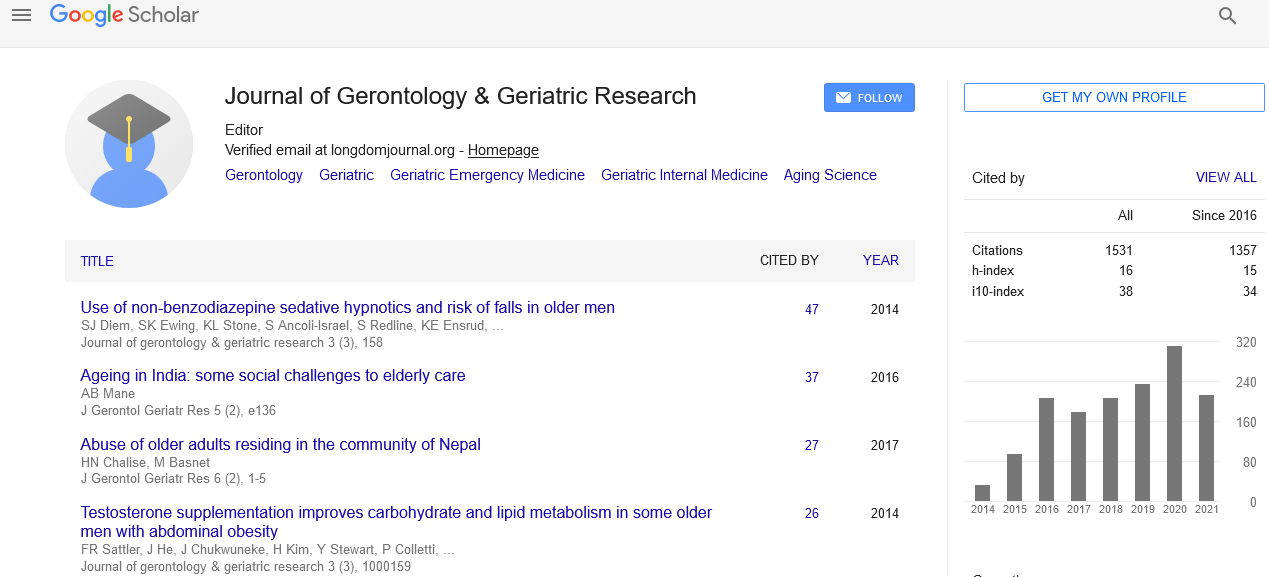PMC/PubMed Indexed Articles
Indexed In
- Open J Gate
- Genamics JournalSeek
- SafetyLit
- RefSeek
- Hamdard University
- EBSCO A-Z
- OCLC- WorldCat
- Publons
- Geneva Foundation for Medical Education and Research
- Euro Pub
- Google Scholar
Useful Links
Share This Page
Journal Flyer

Open Access Journals
- Agri and Aquaculture
- Biochemistry
- Bioinformatics & Systems Biology
- Business & Management
- Chemistry
- Clinical Sciences
- Engineering
- Food & Nutrition
- General Science
- Genetics & Molecular Biology
- Immunology & Microbiology
- Medical Sciences
- Neuroscience & Psychology
- Nursing & Health Care
- Pharmaceutical Sciences
EFFECTIVENESS OF Cucumis sativus EXTRACT (CSE) VERSUS GLUCOSAMINE-CHONDROITIN (GC) IN THE MANAGEMENT OF OSTEOARTHRITIS: A RANDOMIZED CONTROL TRIAL
2nd International Conference on Aging & Gerontology
June 26-27, 2017 San Diego, CA, USA
Robert Nash & Boris Azantsa
PhytoQuest Limited, UK
University of Yaounde, Africa
Scientific Tracks Abstracts: J Gerontol Geriatr Res
Abstract:
Statement of the Problem: The global prevalence of osteoarthritis (OA) is escalating worldwide, primarily because of the aging of populations and an increase in the prevalence of obesity. This study aimed to evaluate the ability of Q-Actinâ?˘, a proprietary Cucumis sativus extract (CSE) to improve knee symptoms in OA. Methodology & Theoretical Orientation: A six-month (180 days) randomized, double-blind study was conducted with two groups of patients diagnosed with primary OA of the knee to compare the effects of CSE with that of a combination of glucosamine hydrochloride and chondroitin sulphate (GC). One hundred and twenty-two (122) OA patients aged 40-75 years with a body-mass index (BMI) of 18-30 kg/m2 were evaluated. The patients received either 10 mg of CSE or 1350 mg of GC (control) twice a day for 180 days. Pain, stiffness and physical function were assessed in each patient using standard tools including: Visual Analog Scale (VAS), Lequesne's Functional Index (LFI), and Western Ontario and McMaster Universities Osteoarthritis Index (WOMAC) at baseline (Day 0) and at Days 30, 60, 90, 120, 150 and 180. The results were expressed as relative scores in percentages. Findings: The CSE (Q-Actinâ?˘) treatment significantly (p<0.05) reduced the WOMAC, VAS, and LFI scores throughout the study. The CSE WOMAC score decreased by 22.44% at Day 30 and 70.29% at Day 180. The GC group results also decreased throughout the study, however, the reductions in the CSE group were significantly (p<0.05) greater than those of the GC group at all-time points. No Adverse Events (AEs) were recorded. Conclusion & Significance: Our results indicate the efficacy and potential use of CSE (Q-Actinâ?˘) as an anti-OA, joint support therapy which can help bring about an improvement in knee pain, stiffness, and physical functions .
Biography :
Robert J. Nash is CEO of PhytoQuest Limited, a natural products discovery and development company based in Aberystwyth. He has published over 200 papers and is inventor on several granted patents. The company focuses on small molecules called iminosugars that have many effects in animals via sugar receptors. He started his career working on anti-viral compounds with the UK Medical Research Council and then became Head of Chemistry at a government research laboratory (IGER) from where he formed multiple companies developing new pharmaceutical compounds based on immunologically active iminosugars.
Email: robert.nash@phytoquest.co.uk


